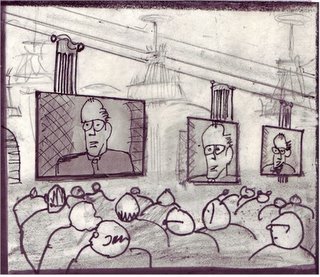Lotta people have blogs. And they have a unique way of chattering. They are part of a phenomenon that is being called “the long tail.” They are getting more buzz than traditional media these days. Of course they try to do traditional media things from time to time, and end of year lists is one of those things.
No different am I - I have been doing a music list [The Veneberal Proud Truth Music Awards] on my blogs for a few years including last year. This is the year the music ground down to 16 rpm. Stuff was not as good. Which is not to say I didn’t hear a lot of great music, it just didn’t much of it fall into the boundaries of Jan – Dec 2005.
My top pick and a lot other peoples’ – big white traditional media and long black tail media alike -- top pick comes from within the confines of the year and doesn’t. It’s the “Thelonius Monk Quartet with John Coltrane at Carnegie Hall.” Released this year, the CD comprises a 1957 concert recording for the Voice of America that was misplaced and forgotten and recently discovered. So we are in Rod Serling Twilight Zone territory with this one. The are two giants from a time when there were giants. They are taking the stage. With different musical cores, they make beautiful music together. Monk dismembers and remembers tunes with a fabulously abstract conception. Coltrane in a few months of steady gigs has absorbed the ethos and is busting at the seams with his own musical notions. It’s great, and the lostness and foundess of it adds tonic. Call it abstract expressionism.
At that point the ‘CD’s of the year’ list breaks down for me. All I can point to is numbers, cuts of CDs. No full fledged CDs impressed me that much.
I guess going with songs rather than full album makes sense. It is in the age of iPod, which is really only a slight remove to the days of the 45, singles and hits that held sway before the days of Sgt. Pepper, Morrison Hotel, and Planet Waves [when a handful of artists were actually capable of producing full formed LPs].
But continuing my picks to click. Let’s have a drum roll for Fiona Apple’s “Extraordinary Machine.”
She is a wordsmith and puts her personality in her singing. Off beat rhythm. The music is much more creative than what you hear in pop these days by a long way. String section, winds including oboe, xylophone and .. prize fight bell.
Before she sings that bell rings, and well it got my attention.
I certainly havent been shopping for any new shoes
-And-
I certainly haven’t been spreading myself around
I still only travel by foot, and by foot it’s a slow climb
But I am good at being uncomfortable so I cant stop changing all the time.
Fiona....don’t know how to describe it but whole album doesnt live up for me to the title track but sure is intersting. It’s Sgt. Pepper chords or maybe Magical Mystery Tour progressions...maybe early [Mary Hopkins] Apple [ha!] era sound actually, certainly clever instrumentation. It’s that Beatles alternating chord piano sound, right? The way Jake described Extraordinary Machine musci: It's like kids music..where the different instruments take on the roles of animals..where a bell might indicate you should turn the page...where the beat is the elephants walking through the city to the circus show. Like yknow?
She gets in some pretty good licks on the old male half of humanity, but like Joey Ramone said of Maria Bartoloma, “Those eyes make everything okay.”
Now, throttling down to my third and last formal pick, Mr. Clark: Now, on our stage, it is John Prine with “Clay Pigeons” from Fair & Square. Prine is deeper and heavy than a Midwestern Moses and still light as DewChomp. He hit the later life stride with “The Missing Years,” and this one dont quite hit that bar...but like Fionna, he makes you pull the car over. This number was actually written by Blaze Foley..sure sounds like it fell off the old Prine tree.
I’m going down to the Greyhound Station
and get me a ticket to ride
I’m gonna find that lady with two or three dids
And sit down by her side.
Okay. It was a tough year for me to keep up with things. Bet I missed something! Of course, if you get out of the confines of this particular Gregorian temporal interval, there were even more good numbers, LPs, and artists. From days of yore. The Rod Serling era. Found this year Peter La Farge, Patrick Sky and the Black Elk Singers [Native Americans, all], Elmore James Capricon boxed set, “Zambita” [and more] by Gustavo Santaolalla on “The Mortorcycle Diaries”, and from a DooWop box, the immortal strains of Ruby by the Drifters.
All my love and money too
Tomorrow night
Will belong to you...

